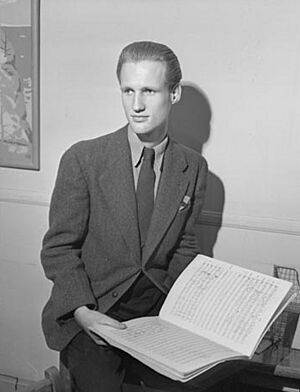Harry Somers facts for kids
Quick facts for kids
Harry Somers
|
|
|---|---|

Somers in 1947
|
|
| Background information | |
| Born | September 11, 1925 Toronto, Ontario, Canada |
| Died | March 9, 1999 (aged 73) Toronto, Ontario, Canada |
Harry Stewart Somers (September 11, 1925 – March 9, 1999) was an important Canadian composer of modern classical music. He was given the Order of Canada, which is one of the highest awards a Canadian citizen can receive.
Harry Somers was sometimes called the "Darling of Canadian Composition." He helped start the Canadian League of Composers (CLC). He also played a role in creating other Canadian music groups, like the Canada Council for the Arts and the Canadian Music Centre. Many of his musical pieces were ordered by the Canadian Broadcasting Corporation and the Canada Council for the Arts.
Contents
Biography
Harry's Early Life
Harry Somers was born in Toronto, Ontario, Canada, on September 11, 1925. He didn't start formal music lessons until he was a teenager in 1939. That year, he met a doctor and his wife who both played piano. They introduced him to classical music.
Somers later said that this meeting sparked something inside him. He became completely focused on music. From that moment, he knew that music would be his life's path.
Learning About Music
When Harry was 14, he began learning piano from Dorothy Hornfelt, a local piano teacher. After two years, he passed a high-level exam at the Toronto Conservatory.
In 1942, Somers started studying with Reginald Godden] at the conservatory. Godden later suggested that Somers study with John Weinzweig. Weinzweig taught him traditional music theory and also introduced him to advanced composition methods. Somers continued to learn from Weinzweig until 1949.
In 1943, Somers paused his studies to serve in the Royal Canadian Air Force during World War II. After the war, he returned to the Royal Conservatory. He continued with Weinzweig and also studied piano with Weldon Kilburn]. During this time, Somers was writing and performing his own music.
He finished his studies at the conservatory in 1948. That summer, he went to San Francisco to study piano with E. Robert Schmitz. His musical work was even part of the art competition at the 1948 Summer Olympics.
In 1949, Somers decided to focus mainly on composing music. He received a scholarship to spend a year in Paris. There, he studied composition with Darius Milhaud. In Paris, Somers heard the music of Boulez and Messiaen. These composers would later influence his own musical style.
Composing in the 1950s and 1960s
After his year in Paris, Somers spent the 1950s focusing on writing music. He earned money by copying music for others. In 1951, he composed his Symphony No.1. He also improved his guitar playing skills during this time.
In the 1960s, he earned money from people or groups who asked him to write music for them. He went back to Paris to study composition more, thanks to a fellowship from the Canada Council for the Arts. While there, he studied Gregorian chant, which is a type of old church music. In 1963, he joined the John Adaskin Project, which brought music into schools. Also in 1963, Somers started hosting televised concerts for young people on the Canadian Broadcasting Corporation (CBC).
Somers's first wife, Catherine Mackie, passed away in 1963.
From 1965 to 1969, Somers hosted the CBC radio show "Music of Today." He also worked as a special consultant for the North York School in Toronto from 1968 to 1969. In 1967, he married Canadian actress Barbara Chilcott. That same year, he created his most famous work, the opera Louis Riel. This opera was commissioned for Canada’s 100th birthday celebrations. In 1969, he received a grant to spend two years in Rome. While there, he wrote Voiceplay and Kyrie.
Later Years: 1970s – 1990s
In 1971, after returning to Canada from Rome, Somers was made a Companion of the Order of Canada. He received three honorary doctorates from universities: the University of Ottawa (1975), York University (1975), and the University of Toronto (1976).
In 1977, Somers visited the USSR (now Russia and other countries). He gave talks about modern Canadian music and met other composers. During the 1980s, he received requests to compose music for several festivals and competitions, including the Canadian Opera Company.
In the 1990s, he composed two operas: Serinette and Mario the Magician. He also finished his Third Piano Concerto in 1996. Somers gave a speech at the Alberta Music Conference in 1993. He wrote a choral piece for the 50th Anniversary of the United Nations in 1995. In 1997, he was a special guest writer at the first "Word and Music Festival" at the University of Windsor. Canada honored him in 1995 with special concerts for his 70th birthday.
Harry Somers passed away on March 9, 1999, in Toronto, Ontario.
Musical Styles
Harry Somers had a very diverse approach to music. His works were performed in many places, including the United States, Central and South America, Europe, and the Soviet Union. His music often included special vocal techniques, like using different vowel sounds and breath sounds.
The musical styles that influenced Somers the most were those of Weinzweig, Bartók, and Ives. He was also influenced by Baroque counterpoint (a way of combining melodies), serial technique (a modern composing method), and Gregorian chant (old church music).
In the 1940s, under Weinzweig, Somers received his first formal lessons in composing. Before that, he mostly wrote piano pieces similar to the ones he played. In the 1950s, Somers focused on using techniques related to fugue, which is a type of musical composition where a short melody is introduced by one part and then taken up by others. More than half of his works written between 1950 and 1961 contain fugue-like sections. Some of his pieces have a "sharp, energetic, rhythmic feel."

